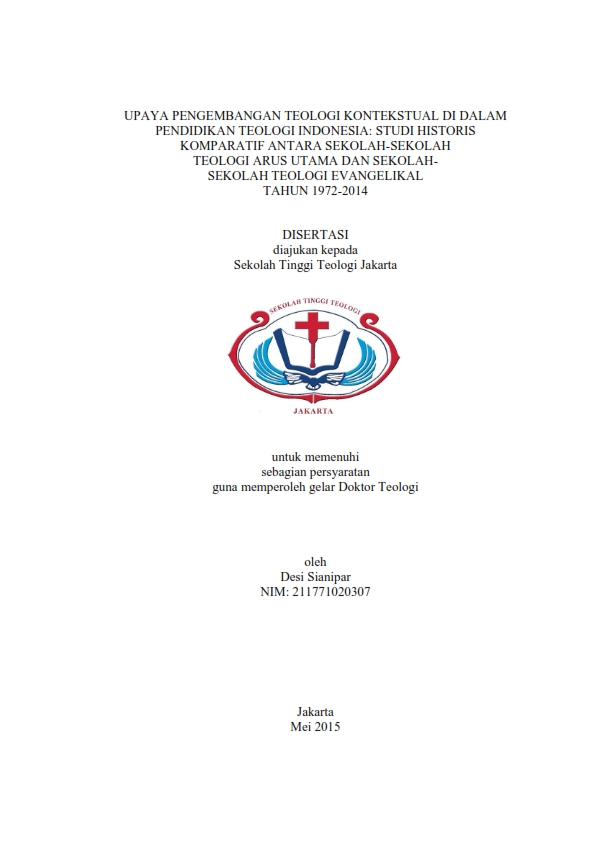
In this dissertation, the author finds that the efforts to develop contextual theology in theological schools in Indonesia have not been significant since 1972. Since that time the term „contextualization‟ was popularized by the Theological Education Fund (TEF) and both mainstream and Evangelical theological schools committed to develop contextual theology for the sake of relevance and as a contribution of theological education to church and society, especially in Indonesia. Many studies have given their opinions about this, but they were not supported by the evidence of accurate research. Therefore, this study aims to investigate the development of contextual theology in the period 1972-2014, and how and why it is carried out both in mainstream theological schools (especially STT GKE Banjarmasin and FT-UKDW Yogyakarta) and also in Evangelical theological schools (especially STT SAAT Malang, I-3 Batu , and STTII Yogyakarta). This research includes the history of theological education, theological views, the concept of contextual
theology, models of contextual theology, the results of the development of contextual theology, the benefits and goals of the development of contextual theology, and the challenges faced in the development of contextual theology in these two theological education groups.
Based on the historical-comparative study through literature reviews, in-depth observations and interviews, and based on the contextual theology theories of Stephen B. Bevans and other contextual theologians, this study finds that both groups of theological schools have been endeavouring to develop contextual theology. The mainstream theological schools understand contextual theology as striving to consider context seriously by a theological approach beginning from the context and by
emphasizing dialogue. This contextual theology approach emphasizes freedom but
still tends to use the anthropological, synthesis, and praxis methods. Their reason for contextual theology is to appreciate and to meet the needs of the current context in their locations. Meanwhile, Evangelical theological schools understand contextual theology as an effort to consider the context seriously through the textual approach (the Bible and church tradition) and emphasizes application. Their approach to contextual theology tends to use countercultural methods. Their reason for contextual theology is to operate (apply) the culture and evangelism mandates.
Based on this research, the author noticed that the success in the development of contextual theology cannot be measured only by the number of contextual theological works in written form produced by theological schools. Nor can it be measured by the concepts and the methods of contextual theology used by theological schools, as certain theological schools are less concerned to write down their thoughts or opinions, or are less skilled in writing, yet can still be successful in the application of their concepts in ministry in church or society.
Therefore, after completing this research, the author proposes several ways to make the development of contextual theology in theological schools become more significant, namely theological schools should: cooperate by applying theology of partnership; have a contextual vision and mission; develop a contextual and integrated curriculum, balanced in its intellectual, spiritual and ministry aspects; promote interdisciplinary studies by establishing study centers; have well-qualified human resources (faculty and students); seek for full support from their sponsoring foundations/churches; encourage freedom to develop thoughts and methods of contextual theology; give proper exercise in doing contextual theology theoretically and practically; have real involvement in the context; and cooperate with theological
and non-theological institutions that support the development of contextual theology.
| Creator(s) |
|
| Contributor(s) |
|
| Publisher | STT Jakarta |
| Language | Indonesian |
| Series | Katalog Universitas |
| Category | s2 |
| Sub Category | Thesis |
| Source | 1500351;SIANIPAR, Desi;2111020307 |
| Copyrights | The resource(s) is/are owned by the Creator/Contributor.Reproduction & distribution for non-commercial purposes is permitted provided that the credit for the Creator/Contributor and the source are explicitly stated,and no alteration are made |
| Subjects |
|
Files
- jkpthj-is-s2-2015-2111020307-159-pendidikan_teologi-cover.jpg

- jkpthj-is-s2-2015-2111020307-159-pendidikan_teologi-cover.pdf
- jkpthj-is-s2-2015-2111020307-159-pendidikan_teologi-abstract_toc.pdf
- jkpthj-is-s2-2015-2111020307-159-pendidikan_teologi-conclusion.pdf
- jkpthj-is-s2-2015-2111020307-159-pendidikan_teologi-references.pdf

